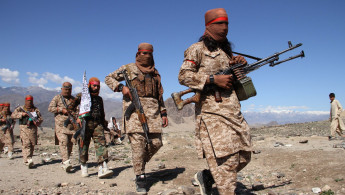Taliban now discouraging fighters from taking multiple wives. The reason may surprise you
The hardline Islamist group has urged members to avoid "corrupt and illegal practices" regarding polygamy.
2 min read
Most of the Taliban leadership have mutliple wives [Getty]
The leader of the Afghan Taliban has told members to avoid taking multiple wives so that the hardline Islamist militant group will not invite "criticism from our enemies".
Mullah Hibatullah issued a decree warning Taliban members against the practice so "they won't need to get involved in corrupt and illegal practices", the BBC reported.
The prevelance of polygamy has increased demands upon the Taliban leadership for funds to pay "mahr" (also known as dower) - money paid by a man to a woman's family when he marries her - Taliban sources told the BBC.
The group's leadership is concerned over allegations of corruption among members attempting to raise funds to cover multiple households, the sources said.
The decree does not ban the practice, however.
Men are permitted to take as many as four wives under Islamic law, and polygamy is legal in Afghanistan and neighbouring Pakistan, where the Taliban are also active.
The practice is widespread among the Pashtun communities of Pakistan and Afghanistan.
Mullah Hibatullah's decree provided exceptions for men who have no children or no male children from a previous marriage, those with existing family wealth, and those wishing to marry a widow.
Taliban members should consult their superiors before arranging a second marriage, the decree said.
Most of the Taliban's top leaders have married multiple women. Mullah Hibatulah, the movement's current leader, has two wives.
That puts the leadership of the Taliban at odds with ther rank-and-file of the group, most of whom live in poverty.
The new restrictions on polygamy come amid ongoing talks with the Afghan government led by President Ashraf Ghani.
Reports about Taliban members forcibly marrying women and paying "mahr" sums of between $26,000 and $100,000 have invited unwanted negative press during a sensitive political moment.
Follow us on Facebook, Twitter and Instagram to stay connected
Mullah Hibatullah issued a decree warning Taliban members against the practice so "they won't need to get involved in corrupt and illegal practices", the BBC reported.
The prevelance of polygamy has increased demands upon the Taliban leadership for funds to pay "mahr" (also known as dower) - money paid by a man to a woman's family when he marries her - Taliban sources told the BBC.
The group's leadership is concerned over allegations of corruption among members attempting to raise funds to cover multiple households, the sources said.
The decree does not ban the practice, however.
Men are permitted to take as many as four wives under Islamic law, and polygamy is legal in Afghanistan and neighbouring Pakistan, where the Taliban are also active.
The practice is widespread among the Pashtun communities of Pakistan and Afghanistan.
Mullah Hibatullah's decree provided exceptions for men who have no children or no male children from a previous marriage, those with existing family wealth, and those wishing to marry a widow.
Taliban members should consult their superiors before arranging a second marriage, the decree said.
Most of the Taliban's top leaders have married multiple women. Mullah Hibatulah, the movement's current leader, has two wives.
That puts the leadership of the Taliban at odds with ther rank-and-file of the group, most of whom live in poverty.
The new restrictions on polygamy come amid ongoing talks with the Afghan government led by President Ashraf Ghani.
Reports about Taliban members forcibly marrying women and paying "mahr" sums of between $26,000 and $100,000 have invited unwanted negative press during a sensitive political moment.
Follow us on Facebook, Twitter and Instagram to stay connected





 Follow the Middle East's top stories in English at The New Arab on Google News
Follow the Middle East's top stories in English at The New Arab on Google News
![Israeli forces ordered bombed Gaza's Jabalia, ordering residents to leave [Getty]](/sites/default/files/styles/image_330x185/public/2176418030.jpeg?h=a5f2f23a&itok=_YGZaP1z)

